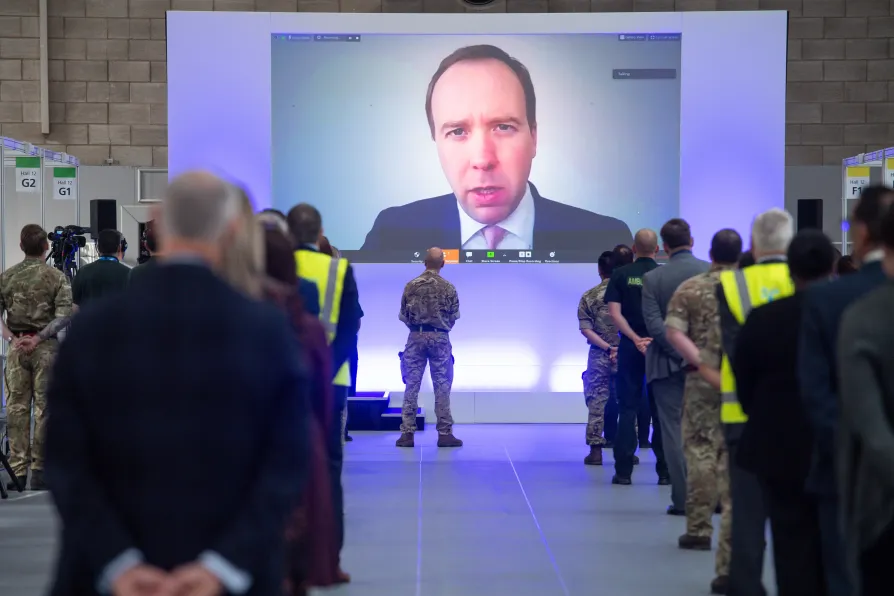
 Health Secretary Matt Hancock speaks via videolink at the opening of the NHS Nightingale Hospital Birmingham, in the National Exhibition Centre, yesterday
Health Secretary Matt Hancock speaks via videolink at the opening of the NHS Nightingale Hospital Birmingham, in the National Exhibition Centre, yesterday
HEALTH Secretary Matt Hancock today repeatedly refused to guarantee that NHS and social care staff would have enough personal protective equipment (PPE) this weekend.
Mr Hancock was grilled online by MPs, including his predecessor Jeremy Hunt, as part of the Commons health committee’s scrutiny of the government’s handling of the coronavirus outbreak.
Committee chairman Mr Hunt had a controversial tenure as health secretary, overseeing underfunding and part-privatisation of the NHS, as well as two junior doctors’ strikes in one week.
Mr Hancock repeatedly failed to guarantee that every hospital would have enough medical gowns to get through the weekend.
A week ago, he promised that there would be enough PPE as long as the “precious resource” was not “overused” — insinuating that medics could be wasting supplies.
And today, he passed blame for the risky re-use of single-use PPE — due to shortages of masks, gowns, gloves, shields and goggles — onto clinicians, saying it was their decision.
Labour shadow health minister Justin Madders told the meeting it was a “scandal” that there was still a shortage of PPE, as frontline workers had been “sounding the alarm for weeks now.”
“The government has had months to put things in place,” he said.
“It is outrageous that supplies keep running so low: protecting those staff who are risking their lives every time they go to work should be an absolute priority.
“Ministers need to make good on their promises, sort out the supply issues and work to make sure no staff member feels unsafe because of a lack of PPE.
“It is no good making grand promises if they later turn out to be undeliverable.”
Government inaction over PPE production has in some cases forced NHS trusts to take matters into their own hands, with one director asking the BBC to put him in touch with clothing firms Burberry and Barbour, which are manufacturing medical gowns.
That trust — which the BBC has not named — had “less than 24 hours’ supply [with the] weekend coming up.”
Mr Hancock claimed that 55,000 more gowns would be arriving today, but admitted to facing “challenges”, saying: “We are tight on gowns and that is the pressure point.”
The committee session came after a highly critical letter about PPE was sent to the Department of Health and Social Care by the Association of Directors of Adult Social Services (Adass).
Adass raised concerns that care was not being given equal consideration to the NHS, and that PPE provision for the sector was “shambolic.”
Mr Hunt asked why government guidance does not require PPE to be worn in care homes to attend to non-Covid patients and if it was suggested that a risk was being taken with the residents.
Mr Hancock said he did “not think” the government was risking the lives of elderly and vulnerable people by not requiring care workers to use PPE, though he admitted that the number of Covid-19 related deaths in care homes was likely higher than reported.
Care-home deaths are not counted alongside hospital figures, but are included in Office of National Statistics data which takes longer to publish as death certificates need to be issued first.
On testing, Mr Hancock said that more than 50,000 NHS workers havd now been tested for coronavirus but that he did not know how many health and social-care workers were infected.
Labour MP Nadia Whittome, who has returned to her previous job as a care worker during the pandemic, criticised him for having “no idea” – adding “let that sink in”.
Mr Hancock promised that testing would become more widespread with drive-through centres, mobile units and eventually home-testing kits “when the technology is good enough”.
Weeks ago, he promised that 100,000 people would be tested per day by the end of April. Today, he said that the number of people tested on Thursday was just over 18,000.
He said that eligibility would be expanded to the police, fire service, prison staff, critical local-authority workers, the judiciary and DWP staff who need it.
Mr Hancock was also asked whether the government would be changing its advice for pregnant healthcare workers in the light of the death of nurse Mary Agyeiwaa Agyapong, also known by married name Boateng, on Sunday. Her baby daughter survived.
Mr Hancock could only say that the government worked “very closely” with the Royal Colleges, Public Health England and the NHS to ensure “guidance comes from the most appropriate body for that particular group.”


















